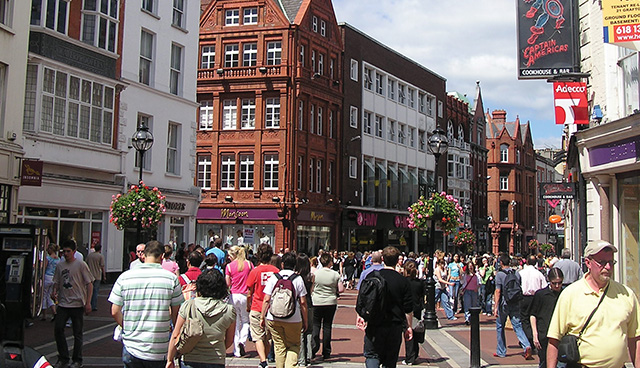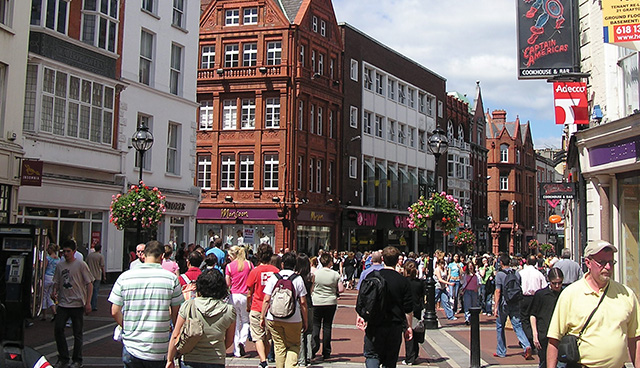An all island economy


Following the completion of his report on the potential economic impact of Irish reunification in the context of Brexit, financial journalist Paul Gosling outlines his key findings.
 Northern Ireland is different from other places in many ways. One of these is the shortage of evidence-based policy-making – though, to be fair, there is no real policy-making of any kind taking place at present without a functioning Executive and Assembly.
Northern Ireland is different from other places in many ways. One of these is the shortage of evidence-based policy-making – though, to be fair, there is no real policy-making of any kind taking place at present without a functioning Executive and Assembly.
What, then, would Northern Ireland look like if policies were driven by evidence? One important piece of evidence is that the economy of the Republic is fundamentally stronger than that of Northern Ireland, with a growing divergence in performance. As the consultancy firm EY put it recently: “The Republic of Ireland sits atop the European growth charts, while Northern Ireland is closer to the bottom.” Economic growth last year in the Republic was 4.9 per cent, while in Northern Ireland it was 1.4 per cent. EY predicts that the Republic will generate an additional 91,000 jobs by 2020 compared to 2016, whereas Northern Ireland will lose 3,500 jobs.
What is the cause of this divergence? In truth, there are several reasons. And, as the respected economist David McWilliams has pointed out, the respective economies have gone in reverse directions since partition. In 1920, 80 per cent of Irish industrial output was in and around Belfast, with Belfast the largest city on the island of Ireland. The economy of the Republic is now four times larger than that of Northern Ireland, with industrial output 10 times larger.
The Republic gained substantially from joining the European Union, which helped the country to accelerate its journey from an agricultural economy to a modern industrial one. US investment, helped by a low corporation tax rate (and tax avoidance manipulations), certainly helped with this. So, too, has investment from the EU. German businesses are now the Republic’s second largest source of FDI, after the US.
But companies, usually, do not invest simply because the tax rate is low. The environment has to be friendly in other ways, as well. Businesses need to invest in a country that is productive. According to PwC, the Republic of Ireland is around 60 per cent more productive than Northern Ireland, while the UK performs 15 per cent better than Northern Ireland. The keys to improving productivity include infrastructure, skills, R&D, innovation and enterprise. These are where Northern Ireland underperforms.
If we want to do better as an economy we need better roads, rail, broadband and electricity connectivity. Investment location decisions are driven by each of these factors. Rural businesses complain about slow internet connections. We have a very limited rail network. And the road system is seriously deficient. Road upgrades are taking place now that should have happened 50 years ago.
Skills are another weakness. We have too few graduates – and those we have, often studied the wrong subjects in terms of the needs of the economy, for example, we are producing too many teachers. A third of our undergraduates study in Great Britain (GB), with very few coming the other way. Employers say that vocational training needs to improve. And we have far too many children leaving school without basic skills.
Devolution has not achieved what it should have done. Earlier periods of Stormont administration failed to create a distinctive economic policy for Northern Ireland, instead continuing with a manufacturing dependence which hurt us as the world’s economy changed. More recent devolution has been no better. Since the signing of the Good Friday Agreement, the gap between the UK and Northern Ireland employment rate has actually widened. Most of the investment that followed the GFA went not to Northern Ireland, but to the Republic.
The Republic has been clever in its targeting of growth sectors, assisted by the very effective IDA – which has performed much better than Invest NI. The Republic is more globally and export focused than is Northern Ireland. As of 2015, exports accounted for 39.5 per cent of Irish economic output, twice the level of Northern Ireland.
Any merger between south and north would need to be through the creation of a new state, not bolting the north onto the south. But the conversation about what happens next for our island needs to begin.
Manufacturing’s collapse led to higher dependence on the public sector here. That, in turn, is a factor in the high subvention received from the UK government. There are differences in opinion and calculations about whether that subvention is £6 billion or £10 billion, or somewhere between. But however it is calculated, there is likely to be a day when the UK government imposes austerity upon Northern Ireland, in the way it has on GB.
Things will have to change, one way or another. Brexit will make sure of that. Leaked analysis conducted by officials in the Treasury concludes that Northern Ireland will be one of the UK regions most negatively affected by Brexit. Northern Ireland’s economy may be between 2.5 per cent and 12 per cent smaller than it would otherwise be because of Brexit, concluded the Treasury economists. The economic cost to Northern Ireland of Brexit is likely to be severe. A 2.5 per cent underperformance by the economy would equate to a loss of around £930 million a year in potential economic activity compared to a non-Brexit scenario; a 3 per cent underperformance in the economy would be an annual £1.1 billion loss of potential activity; an 8 per cent hit would cost the economy £3 billion; and a 12 per cent hit would make the economy £4.5 billion smaller than it would otherwise be. That is equivalent to £2,500 per person.
If the jobs impact was pro rata to the loss in potential economic activity, then we would have 67,000 fewer jobs in Northern Ireland under the 8 per cent assumption and more than 100,000 fewer jobs under the 12 per cent scenario. This damage might be mitigated by Irish reunification and retained membership of the European Union.
Northern Ireland’s agri-food sector is particularly at risk from Brexit. There are more than 29,000 farmers in Northern Ireland, with 87 per cent of Northern Ireland’s total farming incomes coming from the EU’s Single Farm Payment. Common Agricultural Policy (CAP) payments are crucial for Northern Ireland’s farmers, who receive 9 per cent of the UK’s total allocation of EU pillar payments. Brexit provides a further threat to the agri-food sector in depriving it of access to an EU-wide labour market, on which many producers are dependent.
True, Northern Ireland trades much more with GB than with the Republic of Ireland in terms of value – though more with the Republic in terms of the number of transactions. For the North’s small firms, the key markets are Northern Ireland and the Republic of Ireland, not GB. For Northern Ireland, the necessary Brexit outcome involves open borders north and south, and east and west. And that is true even if there is reunification.
The Republic has its failings. Health, housing and regional policies do not work effectively. Any merger between south and north would need to be through the creation of a new state, not bolting the north onto the south. But the conversation about what happens next for our island needs to begin.
The report ‘The Economic Impact of an All-Island Economy’ is published at www.paulgosling.net





